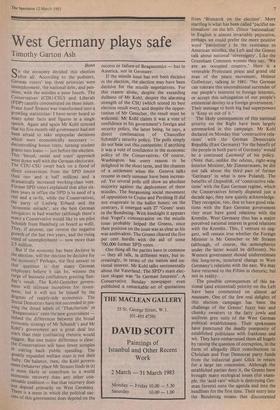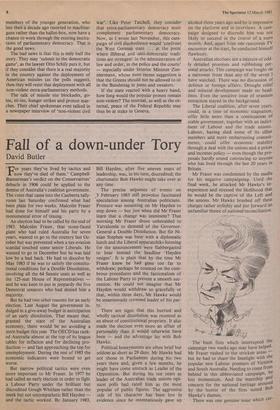West Germany plays safe
Timothy Garton Ash
Bonn So the economy decided this election after all. According to the pollsters, German voters' top three priorities were unemployment, the national debt, and pen- sions, with the missiles a poor fourth. The Conservatives (CDU-CSU) and Liberals (FDP) cannily concentrated on these issues. Franz Josef Strauss was transformed into a growling statistician: I have never heard so many sober facts and figures in a single speech. Again and again Mr Kohl stressed that his five-month-old government had not been afraid to take unpopular decisions which were economically necessary decontrolling house rents, turning student grants into loans — just before the election. This 'blood, sweat and tears' approach went down well with the German electorate. The CDU-CSU swept back on a flood of direct conversions from the SPD (more than one and a half million) and a dramatically increased working-class vote. Former SPD voters explained that after six- teen years in office the SPD is in need of a rest and a re-fit, while the Conservatives, the party of Ludwig Erhard and the economic miracle', are the best German navigators in bad weather (although there's many a Conservative would like to see pilot Schmidt from Hamburg on board as well). They, if anyone, can reverse the negative growth of the last two years, and the rising trend of unemployment — now more than 2.5 million.
But if the economy has been decisive in the election, will the election be decisive for the economy? Perhaps, the first answer to that question is that many German employers believe it can be, witness the surge of business confidence greeting Sun- day's result. The Kohl-Genscher govern- ment will increase incentives for invest- ment, but it will not be bound by the dogmas of supply-side economics. The Social Democrats have not succeeded in pin- !ling the dread labels of `Thatcherism' or Reaganomics' onto the new government — indeed the differences between the broad economic strategy of Mr Schmidt's and Mr Kohl's government are a great deal less stark than their contrasting rhetoric would suggest. But one major difference is clear: the Conservatives will have fewer scruples In cutting back public spending. The greatly expanded welfare state is not their baby. On balance, then, the Kohl govern- ment (whatever place Mr Strauss finds in it) Is more likely to contribute to a world economic recovery than any other con- ceivable coalition — but that recovery does not depend primarily on West Germany. There is a sense in which the political suc- cess of this government does depend on the
success or failure of Reaganomics — but in America, not in Germany.
If the missile issue has not been decisive in the election, the election may have been decisive for the missile negotiations. For this reason alone, despite the exceeding dullness of Mr Kohl, despite the alarming strength of the CSU (which scored its best election result ever), and despite the oppor- tunism of Mr Genscher, the result must be welcome. Mr Kohl claims it was a vote of confidence in his government's foreign and security policy, the latter being, he says, a direct continuation of Chancellor Schmidt's security policy. The polls simply do not bear out this contention: if anything it was a vote of confidence in the economic policy of the Conservatives. Of course, Washington has every reason to be delighted in the short term, and the chances of a settlement when the Geneva talks resume in early summer have been increas- ed. Yet several polls still show an absolute majority against the deployment of these missiles. The burgeoning social movement of opposition to Cruise and Pershing H did not evaporate in the ballot boxes: on the contrary, it emerged with 27 'Green' seats in the Bundestag. With hindsight it appears that Vogel's concentration on the missile issue probably helped the Greens, since their position on the issue was as clear as his was ambivalent. The Greens cleared the five per cent hurdle with the aid of some 700,000 former SPD votes.
One thing all the parties have in common — they all talk, in different ways, but in- creasingly, in terms of the nation and na- tional interest. Mr Kohl talks sentimentally about the Vaterland. The SPD's main elec- tion slogan was 'In German Interests'. A Conservative Sunday newspaper even published a remarkable set of quotations
from 'Bismarck on the election'. More startling is what has been called 'pacifist na- tionalism' on the left. (Since 'nationalism' in English is almost invariably pejorative, perhaps we could prefer the more positive word `patriotism'.) In the resistance to American missiles, the Left and the Greens talk about national 'sovereignty'. Like the Greenham Common women they say, 'We are an occupied country.' Here is a venerable Protestant priest and grand old man of the peace movement, Helmut Gollwitzer, talking in 1981: 'No German can tolerate this unconditional surrender of our people's interests to foreign interests, or accept this subjugation of our people's existential destiny to a foreign government.' Their message to both big bad superpowers is 'Keep us out of it.'
The likely consequences of this national priority on the Right have been largely unremarked in this campaign. Mr Kohl declared on Monday that 'constructive rela- tions' with the German Democratic Republic (East Germany) 'for the benefit of the people in both parts of Germany' would be a continued Leitmotif of his policy. (Note that, unlike the odious, right-wing Interior Minister, Mr Zimmermann, he did not talk about the third part of former `Germany' in what is now Poland). The benefits of Ostpolitik, of 'constructive rela- tions' with the East German regime, which the Conservatives bitterly disputed just a decade ago, they now quietly acknowledge. They recognise, too, that to have good rela- tions with the East German government they must have good relations with the Kremlin. West Germany thus has a major perceived national interest in good relations with the Kremlin. This, I venture to sug- gest, will remain true whether the Foreign Minister is Mr Genscher or Mr Strauss (although, of course, the atmospherics under the latter would be different). No Western government should underestimate this long-term, structural change in West Germany's relations with the east. We may have returned to the Fifties in rhetoric; but not in reality.
The possible consequences of this na- tional (and existential) priority on the Left have been commented on almost ad nauseam. One of the few real delights of this election campaign has been the challenge of the Greens' fuzzy hair and chunky sweaters to the fatty jowls and uniform grey suits of the West German political establishment. Their spokesmen have punctured the deadly pomposity of established politicians with frankness and wit. They have embarrassed them all hugely by raising the question of corruption, in the form of allegedly illicit contributions to Christian and Free Democrat party funds from the industrial giant Glick in return for a large tax concession. Although the established parties deny it, the Greens have brought many ecological issues (for exam- ple, the 'acid rain' which is destroying Ger- man forests) onto the agenda and into the headlines for the first time. Their entry into the Bundestag means that discontented
members of the younger generation, who less then a decade ago resorted to machine- guns rather than the ballot-box, now have a chance to work through the existing institu- tions of parliamentary democracy. That is the good news.
The bad news is that this is only half the story. They may 'submit to the democratic game', as the lawyer Otto Schily puts it, but if they consider that there is a real majority in the country against the deployment of American missiles (as the polls suggest), then they will resist that deployment with all non-violent extra-parliamentary methods.
The talk of missile site blockades, go- ins, sit-ins, hunger strikes and protest mar- ches. Their chief spokesman even talked in a newspaper interview of 'non-violent civil war'. Like Peter Tatchell, they consider that extra-parliamentary democracy must complement parliamentary democracy. Now, as I wrote last November, this cam- paign of civil disobedience would 'confront the West German state ... at the point where illiberal and anti-democratic tradi- tions are strongest: in the administration of law and order, in the police and the courts' — especially under Interior Minister Zim- mermann, whose most recent suggestion is that the Greens should not be allowed to sit in the Bundestag in jeans and sweaters.
If the state reacted with a heavy hand, how long would the popular protest remain non-violent? The internal, as well as the ex- ternal, peace of the Federal Republic may thus be at stake in Geneva.











































 Previous page
Previous page